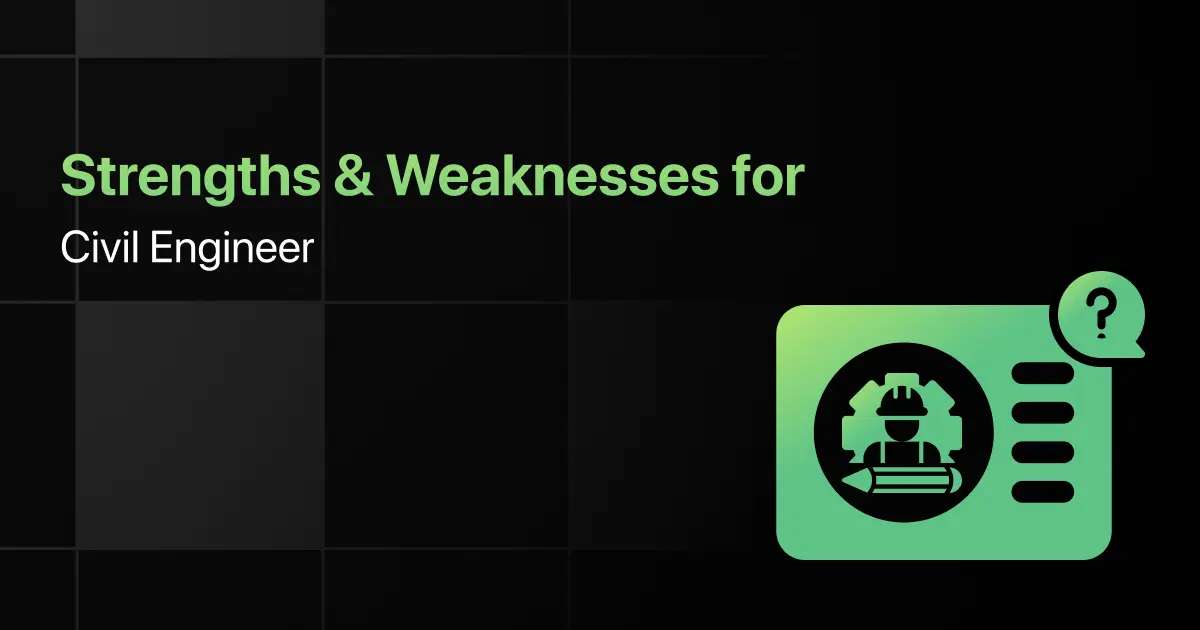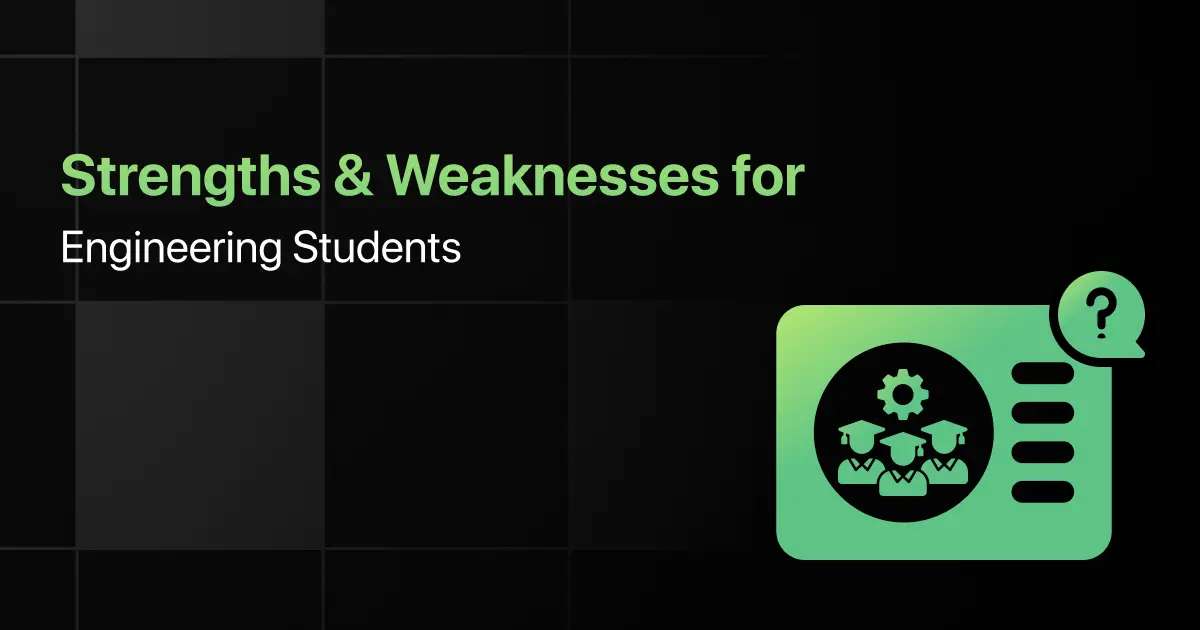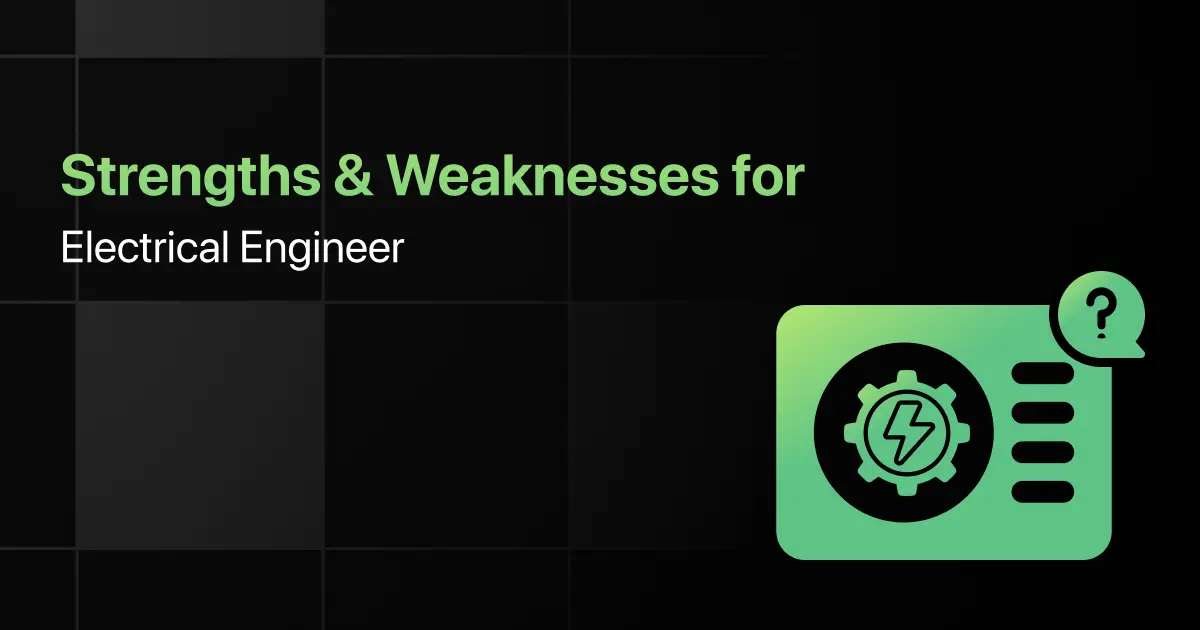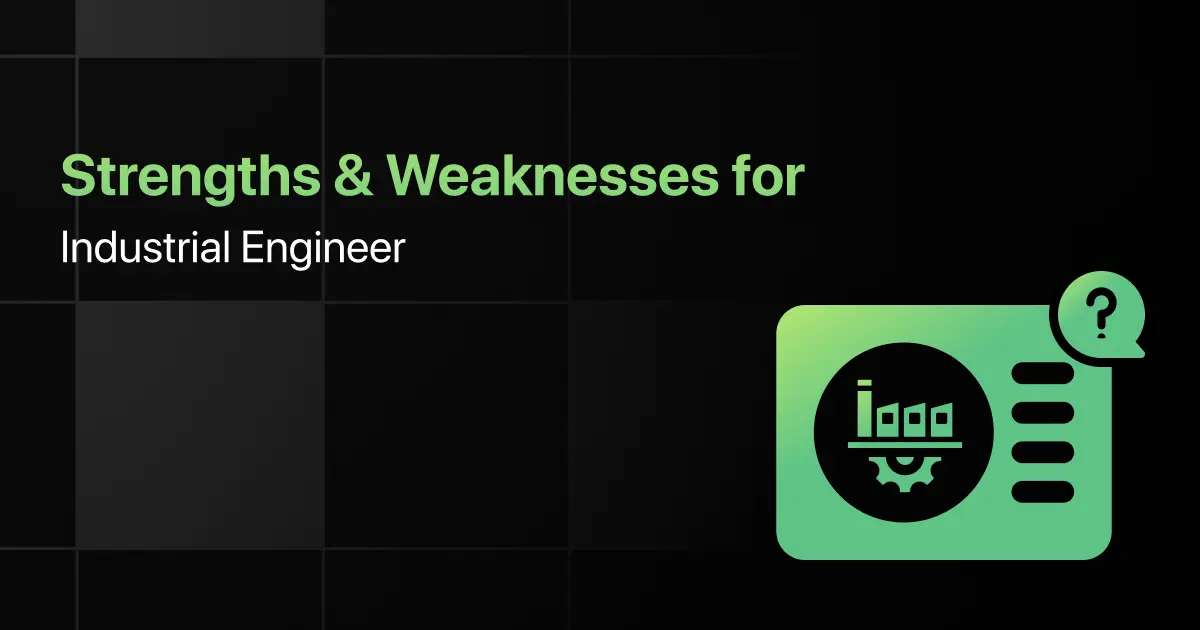Strengths & Weaknesses for Civil Engineer Freshers

When civil engineers go for job interviews, they need to show both their technical knowledge and problem-solving skills.
But one of the hardest parts is talking about their strengths and weaknesses in a way that makes a good impression.
This blog will help with strengths & weaknesses for civil engineers.
Strengths for Civil Engineer Interviews
Below are the 3 strengths for civil engineers for interviews:
1. Expertise in Structural Analysis & Load Calculations
Structural analysis and load calculations are essential for civil engineers to ensure that buildings, bridges, and other structures are safe and stable.
Understanding how different forces affect structures helps prevent failures and ensures long-term durability.
Mastering this skill means making accurate calculations and using software like SAP2000, ETABS, or STAAD.Pro to design safe structures.
Template Version:
“At [Your Previous Company or Project], I applied my expertise in structural analysis and load calculations to design [specific project, e.g., ‘a 10-story commercial building’].
By using [specific software, e.g., ‘ETABS’], I optimized material usage and improved structural stability, which resulted in [specific outcome, e.g., ‘a 15% reduction in construction costs while maintaining safety standards’]. “
Logic Behind This:
This template clearly connects the skill to a real-world project, highlights the tools used, and quantifies the impact, making it easy for employers to see the value.
Mistakes to Avoid:
Don’t just mention software names—explain how you used them.
Avoid saying “I know structural analysis” without giving an example.
Don’t forget to mention the impact of your calculations, like cost savings or safety improvements.
2. Strong Project Management & Scheduling Skills
Managing construction projects efficiently is key to meeting deadlines and staying within budget.
Civil engineers must create realistic schedules, allocate resources properly, and ensure smooth coordination between teams.
Effective project management minimizes delays and keeps projects running efficiently.
Template Version:
“At [Your Previous Company or Project], I managed the construction schedule for [specific project, e.g., ‘a highway expansion project’].
By closely monitoring progress and adjusting plans when needed, I reduced delays by [specific percentage, e.g., ‘20%’], ensuring the project was completed ahead of schedule.”
Logic Behind This:
This version is simple, and demonstrates a clear impact on project timelines and efficiency.
Mistakes to Avoid:
Don’t just say “I manage projects”—explain how you keep projects on track.
Avoid vague terms like “good at scheduling” without providing an example.
Make sure to highlight how your skills helped save time or resources.
3. Deep Knowledge of Geotechnical & Material Science
Understanding soil properties, foundation design, and material behavior is critical for civil engineers.
A strong grasp of geotechnical engineering ensures that structures are built on stable ground, preventing issues like foundation failures or landslides.
Knowledge of materials helps engineers select the best materials for strength, durability, and cost-effectiveness.
Template Version:
“At [Your Previous Company or Project], I conducted geotechnical assessments for [specific project, e.g., ‘a new bridge construction site’].
By analyzing soil properties and selecting the right foundation type, we avoided costly redesigns and ensured long-term stability.”
Logic Behind This:
This template is effective because it directly connects geotechnical and material knowledge to real-world problem-solving, showing the interviewer its benefits.
Mistakes to Avoid:
Don’t just say “I know geotechnical engineering”—mention how you applied it.
Avoid skipping details about soil analysis or material selection.
Don’t forget to explain how your knowledge improved project outcomes (e.g., cost savings, durability).
Weaknesses for Civil Engineer Interviews
Below are the 3 weaknesses for civil engineers for interviews:
1. Limited Experience with New Construction Tech
New construction technologies like BIM, AI-based project management, and advanced materials are changing the industry.
If an engineer isn’t familiar with these, they might struggle to optimize project efficiency and keep up with industry trends.
Template Version:
“In my previous projects, I mainly worked with traditional construction methods and had limited exposure to newer technologies like [insert specific technology, e.g., ‘Building Information Modeling (BIM)’].
To stay updated, I have been taking online courses and attending workshops to improve my knowledge and apply these innovations in future projects.”
Logic Behind This:
This template is good because it clearly states the weakness and reassures the interviewer that you are working to improve.
Mistakes to Avoid:
Don’t say you completely lack experience; mention efforts to improve.
Avoid sounding resistant to new technology.
Don’t ignore industry trends—show that you are staying informed.
2. Challenges in Managing On-Site Workforce
A construction engineer needs to manage workers effectively to keep projects on schedule.
If communication or leadership skills are weak, it can lead to delays, miscommunication, and lower productivity.
Template Version:
“In past projects, I found it challenging to coordinate with large on-site teams, especially when dealing with unexpected issues.
To improve, I have been focusing on better communication strategies and learning more about leadership techniques to manage teams more efficiently.”
Logic Behind This:
This works well because it acknowledges the challenge while showing a strong willingness to improve leadership skills.
Mistakes to Avoid:
Don’t blame workers or external factors—take responsibility.
Avoid sounding like you lack control or confidence.
Don’t ignore the importance of leadership in construction projects.
3. Struggles with Adapting to Changing Regulations
Construction laws and safety regulations change often, and not keeping up can cause compliance issues, project delays, or fines.
Engineers need to stay informed to ensure projects meet legal requirements.
Template Version:
“I’ve noticed that keeping up with changing construction regulations can be challenging since updates happen frequently.
To address this, I’ve started regularly reviewing industry updates and attending compliance training to stay ahead of new requirements.”
Logic Behind This:
This response is effective because it highlights awareness of the issue and a clear plan to stay updated. It reassures employers that compliance is a priority.
Mistakes to Avoid:
Don’t suggest that you ignore regulations or take them lightly.
Avoid blaming the complexity of laws—focus on solutions.
Don’t just state the problem—always mention how you are improving.
Final Words
In the end, knowing how to talk about your strengths and weaknesses can help you do better in job interviews as a civil engineer.
By being clear and honest about what you’re good at and where you can improve, you show that you’re ready to grow and take on challenges in the field.
Frequently Asked Questions
1. What key strengths should a civil engineer mention during an interview?
Civil engineers should highlight problem-solving abilities, strong understanding of construction principles, project management skills, teamwork, and proficiency in design software like AutoCAD and Civil 3D.
2. What are the most common weaknesses of civil engineers?
Common weaknesses include difficulty with multitasking, challenges in managing tight deadlines, limited experience with certain software, and sometimes struggling with communication in large teams
3. How can civil engineering freshers identify their strengths and weaknesses?
Civil engineering freshers can reflect on past academic projects, internships, and feedback from mentors or peers to identify areas of strength and improvement.
4. How can civil engineers frame their weaknesses in a positive way during interviews?
Civil engineers can frame their weaknesses in a positive way by focusing on those they are actively improving and demonstrating their willingness to learn, adapt, and grow.
5. What technical skills should civil engineers emphasize in job interviews?
Civil engineers should emphasize skills like structural analysis, construction management, knowledge of building codes, proficiency in CAD software, geotechnical analysis, and surveying techniques.
Related Posts

Strengths & Weaknesses for Engineering Students Freshers
For engineering students, job interviews can feel challenging because they are just starting their careers. One of the toughest parts is …






